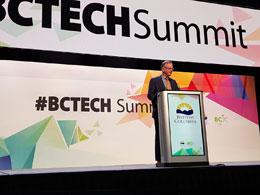BC opens doors for Indian tech talent

Go west young men and women. That is the message from Bruce Ralston Minister of Jobs, Trade and Technology for BC who is keen on inviting Indian tech giants and talent to Canada’s west coast.
“We have a really attractive offer for companies. Please understand that Canada is more welcoming than our neighbours in North America. Canada is also a welcoming country for immigrants with skills unlike most of the developed countries,” said Ralston, on the sidelines of the recent Tech Summit in Vancouver.
The minister told a visiting IANS correspondent that the province has a unique combination of good business environment and infrastructure, health system and strong educational institutions and, above all, inventiveness that make up for a sound base for encouraging talent and industry.
He said British Columbia has established a 100 million Canadian dollar venture capital fund to invest in emerging technology companies across multiple sectors, including Information and Communications Technology (ICT), Digital Media, Clean Tech and Life Science/Healthcare.
India-based Zee Studios International have plans to set up shop in BC employing about 100 employees, Ralston informed.
The tech and innovation sector in British Columbia has grown rapidly over the past 10 years, transforming its economy in ways few could have predicted.
Ralston said the transformation is evident in the increase of technology jobs in British Columbia from over 60,000 in 2002 to more than 110,000 now.
“Today British Columbia is home to globally-recognized talent, trained at international renowned post-secondary institutions and some of the most successful and innovative companies in the industry.
“It’s a sector that accounts for 10,200 companies and approximately 28.9 billion dollars in revenue. For a province of less than five million, these are significant numbers,” the minister informed.
According to Ralston, the tech sector was growing rapidly and many countries have discovered British Columbia.
“We need investment and capital. Secondly, on our side, we are developing more talent. There are 4,000 seats in colleges and universities. With them, we will make sure the business environment is right,” he said.
The government of British Columbia has recently appointed an Information Commissioner — a senior public affairs official to liaise with the federal government and Canadian representatives abroad like in Delhi, Mumbai and Chandigarh.
“Innovate BC has an expanded mandate in British Columbia and globally,” the minister added.
Asked about attracting Indian investment and talent, Ralston said: “We are looking for typically higher skill and knowledge here. We have programmes for experienced entrepreneurs. India has a great reputation in the information technology sector and we are excited about attracting the Indian talent”.
Vancouver has a great start-up environment and they can come and develop here as well as for markets outside, he added.
“We are completing more housing for students, more rapid transit throughout the region so that it is easier to commute. Public health system and transport is also our focus,” the minister noted.
British Columbia has also set up an Immigrant Employment Council (IEC) for attracting global talent.
A report prepared for it by the Association for Canadian Studies (ACS) says that British Columbia is Canada’s leader in tech and has one of the fastest growing tech eco-systems in the world.
However, it feels the current supply cannot meet the industry’s growing demands for tech talent.
“There is clearly a gap in demand and supply of technology professionals in BC, considering the large number of startups that exist here,” said Fazil Mihlar, deputy minister in the ministry of jobs, trade and technology in BC.
Mihlar, who addressed media from the US, the UK, India and China ahead of the Summit said the province would need over 80,000 jobs in the next 10 years across sectors.
“India with its huge talent pool of required skill sets can be a big source of professionals and skilled personnel for our companies in BC,” Mihlar added.
The top countries for the citizenship for nominees programme in 2017 were India, China, South Korea, Australia and the UK. Those with jobs in the tech sector represented 16% of all nominees last year.
Quick Facts:
The tech sector in B.C. is one of the fastest growing sectors of its economy, supporting over 106,000 good-paying jobs. It is home to more than 10,200 businesses.
Over 83,400 tech-related jobs openings are expected by 2027 — jobs such as computer programmers, engineers, information system analysts and software designers.
In January 2018, the B.C. government announced 2,900 tech-related spaces that will produce 1,000 additional tech-grads a year by 2023, to improve access to training and education. This includes the first full civil and environmental engineering program in the North at the University of Northern British Columbia, and the first full software engineering program in the Interior at Thompson River University. To support these new spaces, the Ministry of Advanced Education, Skills and Training plans to increase investment up to $42 million a year in ongoing funding.
In April 2018, the B.C. government partnered with the Government of Canada to provide B.C. biotechnology company STEMCELL Technologies with $45 million to create up to 2,170 B.C. jobs by 2031, and build a state-of-the-art manufacturing facility in Burnaby.
Also in April 2018, the Province, together with the federal government and the Alacrity Foundation, provided the Cleantech Scale-Up program with over $787,000 to help promising clean tech companies throughout B.C. get investment-ready and sell to new markets.
In February 2018, Alan Winter was appointed B.C.'s first innovation commissioner as an advocate for the tech and innovation sector in Ottawa, the Cascadia Innovation Corridor and abroad.









